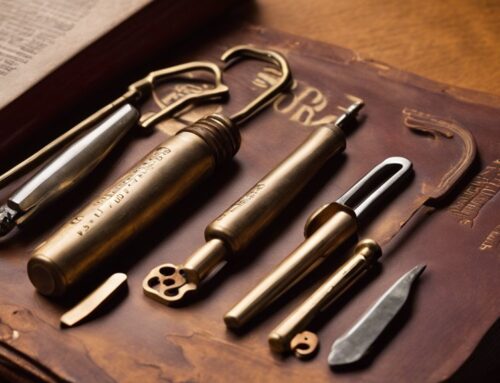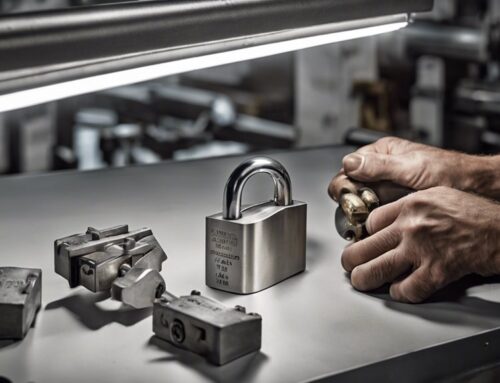If you're considering a career as a locksmith in Ohio, it's important to understand the specific employment laws and requirements you'll encounter. You'll need a high school diploma and relevant training, including certifications that can set you apart in this competitive field. The earning potential can be promising, but what ethical considerations should you keep in mind? As you explore the opportunities ahead, you might find that specialized skills could be the key to advancing your career. What else might be waiting to reveal your success?
Key Takeaways
- A high school diploma is essential, with further education preferred for better employment opportunities in Ohio's locksmith industry.
- Certification through exams like CRL, CPL, or CML is mandatory for locksmiths to be recognized in the state.
- A vendor's license and a criminal background check are required to operate a locksmith business in Ohio.
- Specialization in specific locksmithing areas, such as residential or automotive, can enhance job prospects and earning potential significantly.
- Continuous education with 24 approved training credits every four years is necessary to maintain locksmith certification and stay competitive.
Education and Training Requirements

To become a locksmith in Ohio, you'll mainly need a high school diploma or equivalent, though many employers prefer candidates who've graduated. This foundational level of education is essential, as certain high school courses can give you a competitive edge. Classes like metal shop, mathematics, mechanical drawing, computers, physics, and electronics equip you with skills directly applicable to locksmithing. Additionally, understanding Ohio's laws on digital and smart locks is becoming increasingly important as technology evolves.
You don't need a specialized degree, but consider pursuing additional training. Locksmith schools, community colleges, and vocational programs offer targeted courses. You might also look into apprenticeships, which allow you to work under seasoned locksmiths, gaining practical experience in real-world situations. Apprenticeship programs are essential for hands-on experience, providing a pathway to mastering the trade. Knowledge of regulatory compliance is essential to avoid legal issues, enhancing the value of your training.
Correspondence and online courses, offered by institutions like Ashworth College, provide flexibility for those balancing other commitments. Training typically lasts between three months to four years, with apprenticeships ranging from two to three years. Course content includes fundamental skills like key cutting, lock installation, and understanding security systems.
Mechanical and technical skills are essential, as you'll need to grasp lock mechanisms and maneuver different systems. You should also develop emergency skills for handling situations like locked automobiles or ignition repairs.
Lastly, continuous learning is key. You'll want to stay informed about advancements in lock technology and security, including the legal requirements for installing digital locks. Engaging in ongoing education not only hones your abilities but also opens up more opportunities in this evolving field.
Certification and Licensing

Understanding the certification and licensing requirements for locksmiths in Ohio is vital for anyone looking to establish credibility in this field. To become a state-recognized locksmith, you must pass a certification exam. The recognized certifications include Certified Registered Locksmith (CRL), Certified Professional Locksmith (CPL), and Certified Master Locksmith (CML). Additional specialized credentials, like Certified Professional Safe (CPS) and Certified Master Safe Technician (CMST), are also available through SAVTA. Each certification has specific exam requirements, with CRL encompassing ten mandatory and two elective categories.
Though Ohio doesn't mandate a state license for locksmiths, obtaining one can enhance your authority and reputation. If you plan to operate a locksmith business, you'll need a vendor's license, similar to what's required in other service industries. Additionally, a criminal background check is necessary for application approval. This background check ensures that you have no felony convictions related to theft or violence within the last ten years. Understanding key duplication laws is essential as it will guide your practices and help you maintain compliance. It's also critical to be aware of lock picking laws to ensure you use your skills legally and ethically.
While business insurance and bonding are recommended, they aren't legally required.
To maintain your certification, you'll need to engage in continuing education, which typically requires 24 approved training credits every four years. Keeping documentation of your courses is important and may be requested during recertification.
Moreover, you must adhere to the Locksmith Code of Ethics, ensuring that your practices align with professional standards. While you can legally own lockpicks and tools, remember that their use must comply with legal guidelines.
Job Opportunities and Outlook
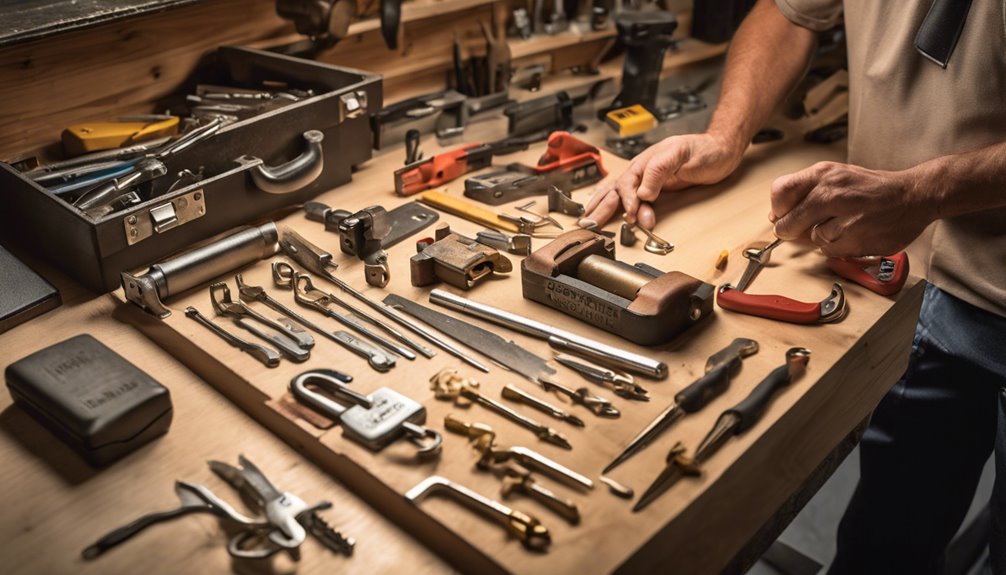
In Ohio, the locksmith job market presents varied salary potentials and specialization benefits. While the average salary stands around $40,723, specialization in electronic security systems can lead to increased earning opportunities. Notably, the overall growth rate for locksmith jobs remains stagnant over recent years, indicating the importance of strategic career choices in this field. Additionally, locksmiths have a crucial role in real estate transactions, which can provide further opportunities for career advancement. Understanding these dynamics can guide you in shaping your career path and maximizing your potential in this field. Furthermore, as locksmiths often assist with changing locks after eviction procedures, this can open additional avenues for securing contracts with landlords and property management companies.
Salary Potential Overview
While the salary potential for locksmiths in Ohio varies greatly by location and experience, it's evident that the field offers a broad range of earning opportunities. Annual salaries can fall anywhere between $30,000 and $80,000. Factors such as urban versus rural settings, experience level, and industry type greatly influence your earnings. Additionally, the field is continually evolving with innovation in security solutions that can increase a locksmith's marketability and income potential.
Here's a quick glance at the average salaries in major Ohio cities:
| City | Average Annual Salary |
|---|---|
| Columbus | $53,140 |
| Cleveland-Elyria | $46,520 |
| Entry-level | $29,000 |
| Master locksmiths | Up to $79,000 |
You should note the potential for higher hourly wages, particularly for emergency services. Starting rates hover around $14, but experienced locksmiths can earn as much as $125 per hour. Factors like self-employment and certifications can greatly boost your income. Additionally, the demand for licensed mobile locksmith services is increasing, further enhancing earning prospects in this profession.
Specialization Benefits
As you explore locksmithing in Ohio, the benefits of specialization become apparent, offering you enhanced job opportunities and a positive outlook in the marketplace. By focusing on specific areas such as residential, commercial, or automotive locksmithing, you can position yourself as an expert and meet varied client needs.
Residential locksmiths handle lockouts, repairs, and security upgrades, making homes safer—an ongoing demand given rising security concerns. This specialization allows you to assess vulnerabilities and recommend tailored solutions, often leading to repeat business. Understanding the relevant tenant rights for lock changes can further enhance your service offerings in residential properties.
On the commercial side, your expertise in complex security systems and key control can prove invaluable. Businesses seek professionals who can maintain their operational security and respond quickly to issues, increasing your desirability.
Automotive locksmithing offers you the chance to work with advanced vehicle security and key programming. As technology evolves, specializing in this area enables you to keep pace with market demands.
Additionally, obtaining certifications like CRL or CPL enhances your credibility. These specialized skills not only expand your career opportunities but also guarantee you remain competitive in a growing field, allowing you more freedom and financial security in your locksmithing career. Moreover, knowledge of high-security lock installations ensures compliance with Ohio standards, boosting both your skills and marketability.
Ethical Considerations

Although the locksmithing profession offers valuable services, ethical considerations play a crucial role in maintaining trust and safety in the industry. When you're contemplating becoming a locksmith, it's important to recognize that your actions directly impact your clients' security and privacy.
Here are three key ethical aspects to reflect on:
- Licensing and Accountability: Verify you're licensed and certified by the appropriate state or local governing body. This process not only validates your knowledge but also holds you accountable for your work and behavior.
- Client Confidentiality: Always prioritize client privacy. You must obtain proper permissions before accessing private property, and you need to protect sensitive information about clients and their security systems. Sharing client data without consent is a breach of trust and legality.
- Professionalism and Integrity: Conduct your services honestly. Be transparent about costs and avoid deceptive practices. Recommend only necessary repairs or services, and aim for non-destructive entry methods whenever feasible.
Continuing Education Importance
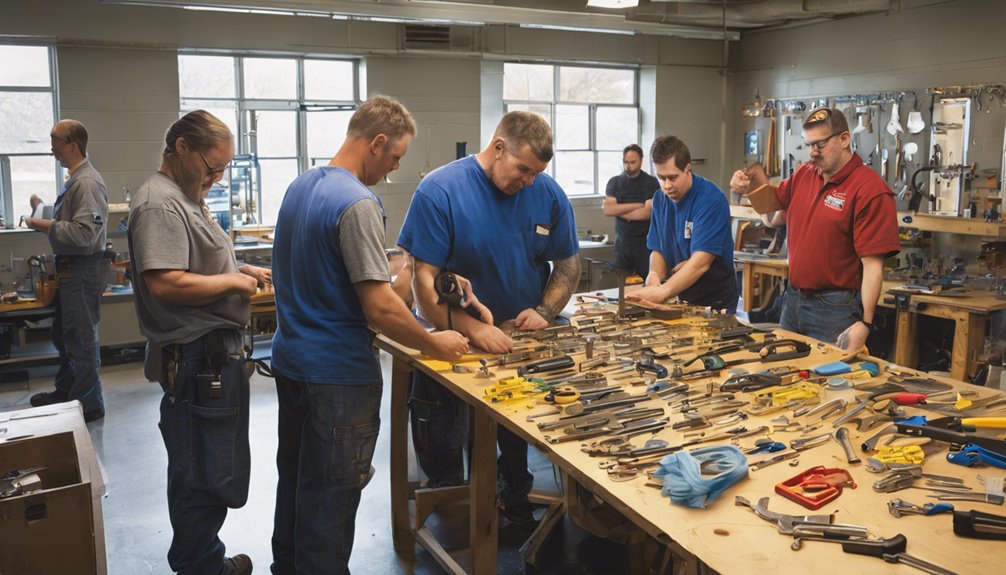
Continuing education is essential for locksmiths not just for meeting compliance requirements, but for enhancing your skills and career prospects as well. While the law may not explicitly state mandates for locksmiths, staying sharp and informed is critical in this evolving field. Compliance with continuing education can safeguard against ineligible license renewals.
| Benefits of Continuing Education | Available Resources |
|---|---|
| Enhanced skills and modern techniques | Trade schools and technical colleges |
| Increased professional credibility | ALOA programs and certifications |
| Improved job opportunities | Online courses and flexible options |
Engaging in ongoing education allows you to specialize in areas like automotive or forensic locksmithing, making you more marketable. In addition, attending workshops and seminars provides not just knowledge but networking chances that can lead to greater career advancement.
As specialists, locksmiths should also be aware that certifications like CRL, CPL, and CML necessitate continued education to maintain validity. Thus, integrating these educational pursuits into your routine is not merely a matter of preference; it's a strategic move for long-term success. By staying updated on the latest trends and technologies, you maintain a competitive edge and demonstrate a commitment to your craft, boosting both your reputation and clientele confidence. Embrace the opportunities continuing education offers—you'll find it's a powerful tool on your locksmithing journey.
Specialized Skills and Advancement
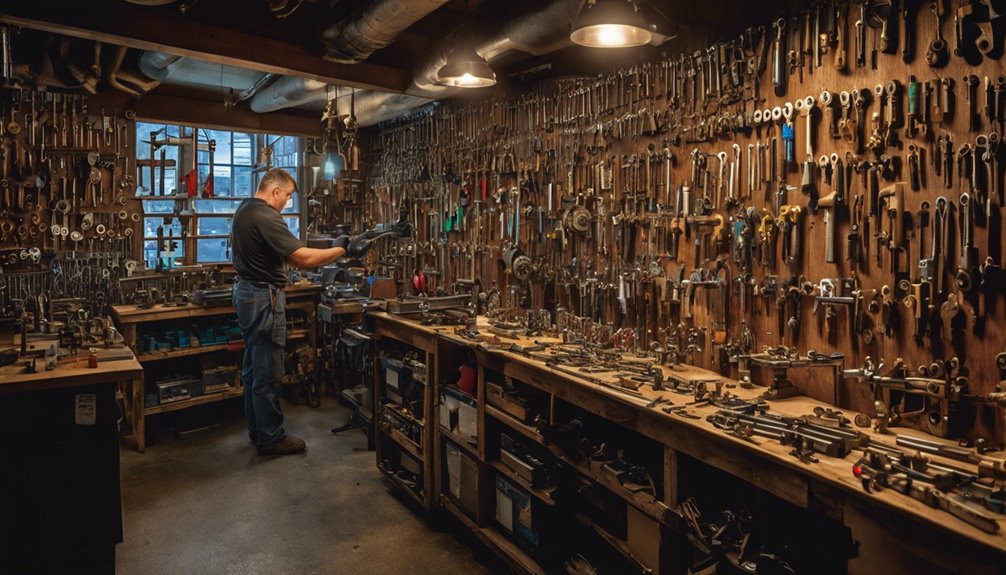
Investing in specialized skills can greatly enhance your career as a locksmith, opening doors to advanced opportunities and increased earning potential. If you want to progress in this field, consider honing your skills in one or more specialized areas:
- Electronic Lock Specialist: Gain expertise in keyless entry systems and biometric scanners. This knowledge enables you to install and repair advanced electronic security systems.
- Safe Technician: Focus on servicing and installing safes and vaults. Master the various locking mechanisms and their specific requirements to provide specialized services that are in high demand.
- Forensic Locksmith: Develop skills in analyzing lock evidence and working with law enforcement. Specialized training in forensic locksmithing not only expands your capabilities but also positions you in a unique niche.
By choosing to specialize, you not only increase your marketability but also boost your earning potential. Many locksmiths find that expertise in areas like electronic security or safe installation leads to higher rates and consistent work.
Additionally, specialized certifications enhance your credibility in the sector, making it easier to attract clients and secure jobs in institutional settings.
As you advance, consider leadership roles in established locksmith companies or even starting your own business. With the right skills and a solid reputation, you can take charge of your career path and enjoy the freedoms that come with being a skilled professional.
Embrace these opportunities, and watch your career flourish.
Frequently Asked Questions
What Are the Job Responsibilities of a Locksmith in Ohio?
As a locksmith, you're responsible for installing, repairing, and maintaining various locking systems and hardware to guarantee security.
You cut duplicate keys, maintain key records, and re-key locks as needed.
You inspect and perform preventive maintenance on security systems while diagnosing issues for repair.
Additionally, you coordinate with other trades and keep accurate activity logs.
Being meticulous in your work and management guarantees the safety and efficiency of your locksmith operations.
How Can I Find Apprenticeships for Locksmith Training?
Ready to reveal your future? Start by reaching out to local locksmith companies for apprenticeship opportunities; many offer on-the-job training.
Look into community colleges for locksmith programs that combine theory with practice, often leading to job placement.
Additionally, check ALOA for training resources and certifications.
Finally, scour online job listings and apprenticeship websites to discover positions that can kickstart your locksmith career.
Your path to becoming a skilled locksmith awaits!
Are There Part-Time Locksmith Jobs Available in Ohio?
Yes, there are part-time locksmith jobs available in Ohio.
You'll find listings at various companies like Snap and Crack Locksmith and Acme Lock & Door Experts, often posted on job platforms like Indeed.
While experience is preferred, many positions don't require it.
You can enjoy competitive pay, flexible scheduling, and potential benefits, making this a great opportunity if you're looking to engage in the locksmith trade without committing full-time.
What Tools Do Locksmiths Typically Use on the Job?
Imagine a knight, armed with tools of liberation, ready to release the chains that bind.
As a locksmith, you rely on essential tools like screwdrivers and wrenches for repairs, precision tweezers for delicate tasks, and lock picking sets to disclose secrets.
You'll wield key cutters for duplication and a flashlight to illuminate dark spaces.
Each tool you use transforms you into a guardian of freedom, restoring access and safety to those who've been locked out.
How Do Locksmiths Handle Customer Privacy and Sensitive Information?
As a locksmith, you must prioritize customer privacy by implementing strict confidentiality measures.
You should establish clear policies to protect sensitive client information and train your employees to handle data responsibly.
Using secure storage methods is essential to safeguard privacy.
Always inform clients about the techniques used for service, favoring non-destructive methods when possible.
Conclusion
In Ohio's locksmith industry, your commitment to education and ethical practices truly sets you apart. With the right training and certification, you're not just opening doors; you're creating pathways to rewarding opportunities. As you hone specialized skills, think of your career as a key that fits perfectly in a lock—only with the right preparation will it turn smoothly. Embrace continuous learning, and watch your potential soar in this dynamic and essential field.



